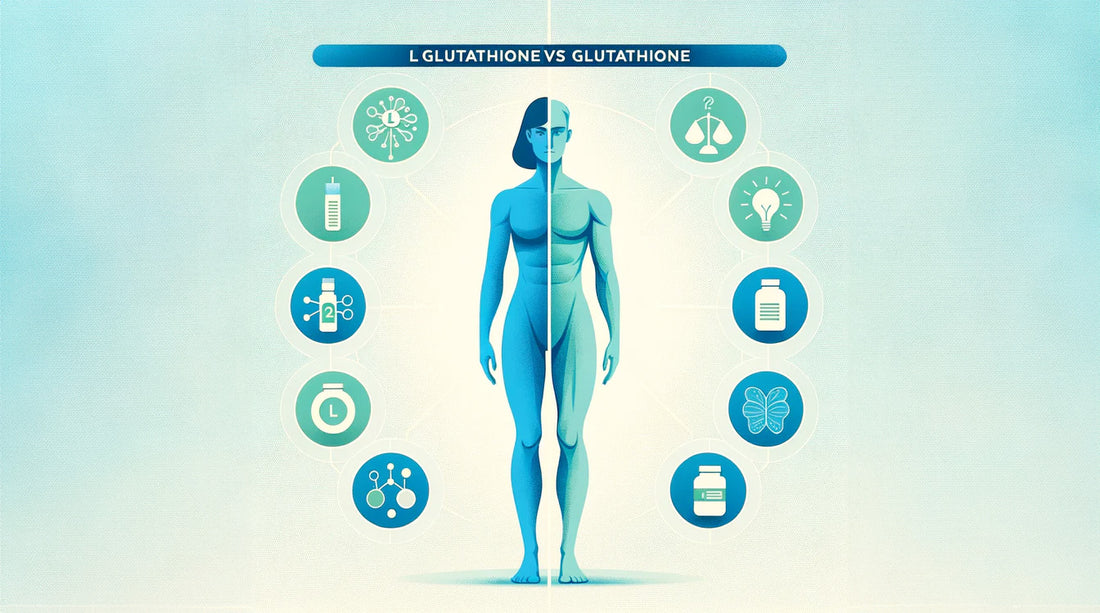

L-Glutathione vs Glutathione: Find the Differences
Table of Contents
When you want to keep your body healthy, there are many supplements you can take. One that's become popular lately is called glutathione. But there are two kinds: L-Glutathione and Glutathione. People often mix them up. In this blog, we'll talk about how they're different and how they affect your body.
We'll cover everything, like what glutathione does in your body, how it helps your health, and how you can take it. We'll explain what makes L-Glutathione special compared to regular Glutathione and which one might be better for you. Let's dive in!
What is Glutathione?
Glutathione is a powerful antioxidant naturally produced in the body. It's composed of three amino acids: glutamine, glycine, and cysteine. This antioxidant plays a crucial role in preventing damage to cells by neutralizing harmful molecules like free radicals and toxins. It's essential for various bodily functions, including supporting the immune system, detoxification, and maintaining cellular health.
What is L- Glutathione?
L-glutathione is a naturally occurring tripeptide found in all living cells. It is composed of three amino acids: glycine, cysteine, and glutamic acid. Glutathione is a powerful antioxidant and plays a crucial role in maintaining cellular health and overall well-being.
The Structure of L-Glutathione
L-Glutathione, comprised of amino acids cysteine, glutamate, and glycine, forms a gamma peptide linkage crucial for maintaining cellular function.
- Glycine: A non-essential amino acid that is the simplest of the twenty amino acids.
- Cysteine: An essential amino acid that is involved in the formation of glutathione and other sulfur-containing molecules.
- Glutamic acid: An essential amino acid that is involved in protein synthesis and other cellular processes.
This structure provides powerful antioxidant and detoxification properties, contributing to its role in cellular health and overall well-being. L-Glutathione's unique composition and properties make it a significant component in the body's natural defense against oxidative stress and toxins.
Food Sources of Glutathione: Incorporating Natural Sources into Your Diet (Check Here)
Understanding Different Types of Glutathione (Check Here)

L-Glutathione vs Glutathione: The Key Differences
Chemical Composition of L-Glutathione vs Glutathione
The amino acids cysteine, glutamate, and glycine are present in glutathione, enabling the detoxification of lipid peroxides and safeguarding cells from harm.
On the other hand, L-Glutathione supplementation impacts tissue damage, skin lightening, and elasticity. Furthermore, glutathione precursors like glycine, glutamine, and methionine stimulate glutathione production. This chemical composition showcases the distinctive properties of both glutathione vs L-Glutathione, shedding light on their varied impacts on cellular health and function.
L-Glutathione vs Glutathione: Bioavailability
Feature |
L-glutathione |
Glutathione |
|
Form |
Natural |
Synthetic |
|
Bioavailability |
Poor |
Poor, but may be slightly higher than L-glutathione |
|
Forms with higher bioavailability |
Sublingual tablets, liposomal supplements |
S-acetyl glutathione |
L-Glutathione vs Glutathione: The Health Implications
Both glutathione and liposomal glutathione have been linked to a number of health benefits, including:
1. Reduced Oxidative Stress
Glutathione is a potent antioxidant produced naturally in the body. It neutralizes free radicals and reactive oxygen species, reducing oxidative stress. Liposomal glutathione, with its enhanced absorption and bioavailability, can potentially amplify this effect, leading to better protection against oxidative damage to cells and tissues.
2. Improved Immune Function
Glutathione supports the immune system by aiding the function of immune cells. It helps regulate the immune response and supports the activity of T-cells, which play a crucial role in the body's defense against pathogens. By reducing oxidative stress, glutathione indirectly supports immune health, and liposomal glutathione may have a more pronounced impact due to its better absorption.
3. Enhanced Detoxification
Glutathione is a vital component in the body's detoxification process. It binds to toxins, heavy metals, and other harmful substances, making them water-soluble and easier for the body to eliminate through urine or bile. Liposomal glutathione's improved bioavailability can potentially enhance this detoxification process, aiding in the removal of harmful compounds from the body more efficiently.
4. Slowed Aging
Oxidative stress is a significant contributor to the aging process. By reducing oxidative stress and protecting cells from damage caused by free radicals, glutathione, and potentially liposomal glutathione, may play a role in slowing down cellular aging. This may manifest as healthier skin, improved cognitive function, and better overall health as the body experiences less oxidative damage.
5. Reduced Risk of Chronic Disease
Chronic diseases like heart disease, diabetes, and neurodegenerative conditions are often associated with increased oxidative stress and inflammation. By reducing oxidative stress and supporting various physiological processes, glutathione and liposomal glutathione may help mitigate these risk factors, potentially reducing the likelihood of developing chronic diseases.
Glutathione supplementation effectively tackles oxidative stress, minimizing cellular damage. On the other hand, L-Glutathione supplementation plays a pivotal role in enhancing skin elasticity, subsequently reducing wrinkles. The results of clinical trials have unveiled significant variations between the effects of the glutathione group and the placebo group. Furthermore, glutathione supplementation has demonstrated positive links to managing asthma, cystic fibrosis, and Parkinson's disease. Conversely, L-Glutathione supplementation impacts melanin levels, offering favorable skin lightening effects.
What is L-glutathione for? (Check Here)
The best way to take liposomal glutathione (Check Here)
L-Glutathione vs Glutathione: Antioxidant Benefits
Glutathione functions as a primary antioxidant, safeguarding cells against oxidative harm. Its role in regenerating vitamins C and E enhances the overall antioxidant effects within the body. Supplementation with glutathione boosts the levels of crucial cellular components, playing a vital role in detoxifying cells. The antioxidant properties of glutathione are instrumental in shielding mitochondria, thereby aiding in the production of ATP. Furthermore, glutathione supplementation has a significant impact on prostaglandins, leading to a reduction in both inflammation and oxidative stress.
Detoxification Process
The detoxification process involving glutathione includes neutralizing toxins, heavy metals, and free radicals, preventing cellular damage. It counteracts hydrogen peroxide, superoxide, and lipid peroxides, effectively reducing damage to cells and mitochondria. Supplementation of glutathione aids in decreasing oxidative stress, thereby reducing cellular and mitochondrial damage. This detoxification process plays a crucial role in influencing reactive oxygen species, ultimately preventing tissue damage. The ability of glutathione to detoxify heavy metals, toxins, and free radicals is vital in supporting overall cellular health.
L-Glutathione vs Glutathione: Supplementation
Feature |
L-glutathione supplement |
Regular glutathione supplement |
|
Stability |
More stable |
Less stable |
|
Absorption |
More readily absorbed |
Less readily absorbed |
|
Effectiveness |
May be more effective for certain conditions |
Less effective |
|
Safety |
Limited research on long-term safety |
More research available on long-term safety |
So the answer is clear, L-Glutathione supplementation is better than Glutathione supplementation.
Glutathione supplementation supports detoxification, antioxidant, and cellular health effects. Clinical trial results evidence glutathione's detoxification effects, reducing oxidative stress. It also influences cellular levels of important antioxidant components.
On the other hand, L-Glutathione supplementation focuses on skin lightening effects and enhancing skin elasticity. Both forms of supplementation offer distinct benefits, addressing different aspects of overall health and wellness. While glutathione works on detoxification and cellular health, L-Glutathione primarily targets skin-related concerns.
Is L-Glutathione Superior to Glutathione?
While both glutathione and L-glutathione have similar effects in antioxidant defense, research suggests that L-glutathione supplementation may provide additional benefits. Studies indicate that L-glutathione can help neutralize reactive oxygen species and support detoxification processes. Combined with vitamin C, L-glutathione may act as a powerful antioxidant.
Let’s Sum Up
In conclusion, both L-Glutathione and Glutathione play important roles in the body's health and well-being. While Glutathione is the natural form of this antioxidant, L-Glutathione is a reduced form that is more stable and bioavailable. Their chemical compositions and bioavailability differ, with L-Glutathione being considered more effective in supplementation.
Both forms offer antioxidant benefits and contribute to the detoxification process in the body. Additionally, they have implications in disease prevention, particularly in maintaining heart and brain health.
Ultimately, whether L-Glutathione is superior to Glutathione depends on individual needs and preferences. It is always recommended to consult with a healthcare professional before starting any supplementation regimen.



















